Jafford Surname Ancestry ResultsOur indexes 1000-1999 include entries for the spelling 'jafford'. In the period you have requested, we have the following 10 records (displaying 1 to 10): Buy all | | | Get all 10 records to view, to save and print for £50.00 |
These sample scans are from the original record. You will get scans of the full pages or articles where the surname you searched for has been found. Your web browser may prevent the sample windows from opening; in this case please change your browser settings to allow pop-up windows from this site. Grantees of offices, commissions and pardons
(1272-1281)
The Patent Rolls are the Chancery enrolments of royal letters patent. Those for the 1st to the 9th years of the reign of king Edward I (29 November 1272 to 17 November 1281) were edited for the Public Record Office by J. G. Black, and published in 1901. The main contents are royal commissions and grants; ratifications of ecclesiastical estates; writs of aid to royal servants and purveyors; and pardons. JAFFORD. Cost: £2.00.  | Sample scan, click to enlarge

| Yorkshire Inquisitions
(1241-1283)
Inquisitions post mortem are inquiries as to the real estate and heir of each person holding in capite or in chief, i. e. directly, from the Crown, or whose estates had been escheated or were in ward. The age and relationship of the heir are usually recorded. Inquisitions ad quod damnum enquired as to any activities (including maladministration by local officials) that had resulted in any material loss to the Crown. Both sets of inquisitions for this period were edited by William Brown for the Yorkshire Archaeological and Topographical Association, and printed in 1891. This index covers all names mentioned, including jurors, tenants, &c. JAFFORD. Cost: £4.00.  | Sample scan, click to enlarge
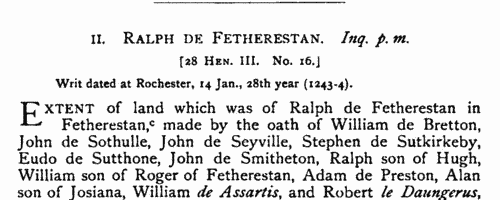
| Close Rolls
(1343-1346)
The close rolls of the 17th, 18th and 19th years of the reign of king Edward III record the main artery of government administration in England, the orders sent out day by day to individual officers, especially sheriffs of shires: they are an exceptionally rich source for so early a period. There is also some material relating to Wales, Scotland, Ireland and the English possessions in France.JAFFORD. Cost: £4.00.  | Sample scan, click to enlarge

| Tenants, founders and incumbents of Yorkshire chantries
(1546-1548)
Chantries were established to perform services for the souls of their founders and other faithful dead, including annual obits and anniversaries at which alms were usually distributed. The chantries could be at an existing altar in a parish church, a new altar in a side chapel of an existing church, in a new chapel in the churchyard or some miles from an existing church: few were founded before 1300, and most date from 1450 to 1500. Hospitals were places provided by similar foundations to receive the poor and weak; there were also religious guilds, brotherhoods and fraternities, and colleges (like large chantries at which three or more secular priests lived in common). An Act of Parliament of 1545 gave king Henry VIII the power to dissolve such chantries, chapels, &c., the proceeds to be devoted to the expenses of the wars in France and Scotland. Commissioners were appointed 14 February 1546 to survey the chantries and seize their property, and from 1546 to 1548 the commissioners produced these certificates giving brief details of the establishment and nature of each foundation, with an inventory of valuables and rental of lands. The individuals named in the certificates are thus the founder, the present incumbent, and the tenants whose rents provided the chantry's income. All the surviving certificates were edited by William Page for the Surtees Society, and published from 1892.JAFFORD. Cost: £6.00.  | Sample scan, click to enlarge

| Tradesmen of York
(1272-1558)
No man or woman could trade in the city of York without having obtained 'freedom' of the city.Their names were recorded on the 'Freemen's Roll', or Register of the Freemen of the City of York, which contains about 19,900 names for this period. A list of names was prepared for each year, the year being here reckoned as starting at Michaelmas (29 September) until 1373, and thence at Candlemas (2 February). Each annual list starts with the name of the mayor and the camerarii or chamberlains. The chamberlains were freemen charged with the duty of receiving the fees of the new freemen; of seeing that only freemen traded in the city; and of preparing this roll, which was compiled from the names on their own account books from the receipts for the fees. There are three groups of freemen: those who obtained freedom after serving out an apprenticeship to a freeman; the children of freemen; and those who claimed freedom by 'redemption', i. e. by purchase or gift from the Mayor and Court of Aldermen.
JAFFORD. Cost: £2.00.  | Sample scan, click to enlarge

| Licences for marriages in southern England
(1632-1714)
The province or archbishopric of Canterbury covered all England and Wales except for the northern counties in the four dioceses of the archbishopric of York (York, Durham, Chester and Carlisle). Marriage licences were generally issued by the local dioceses, but above them was the jurisdiction of the archbishop. Where the prospective bride and groom were from different dioceses it would be expected that they obtain a licence from the archbishop; in practice, the archbishop residing at Lambeth, and the actual offices of the province being in London, which was itself split into myriad ecclesiastical jurisdictions, and spilled into adjoining dioceses, this facility was particularly resorted to by couples from London and the home counties, although there are quite a few entries referring to parties from further afield. Three calendars of licences issued by the Faculty Office of the archbishop were edited by George A Cokayne (Clarenceux King of Arms) and Edward Alexander Fry and printed as part of the Index Library by the British Record Society Ltd in 1905. The first calendar is from 14 October 1632 to 31 October 1695 (pp. 1 to 132); the second calendar (awkwardly called Calendar No. 1) runs from November 1695 to December 1706 (132-225); the third (Calendar No. 2) from January 1707 to December 1721, but was transcribed only to the death of queen Anne, 1 August 1714. The calendars give only the dates and the full names of both parties. Where the corresponding marriage allegations had been printed in abstract by colonel Joseph Lemuel Chester in volume xxiv of the Harleian Society (1886), an asterisk is put by the entry in this publication. The licences indicated an intention to marry, but not all licences resulted in a wedding. JAFFORD. Cost: £4.00.  | Sample scan, click to enlarge
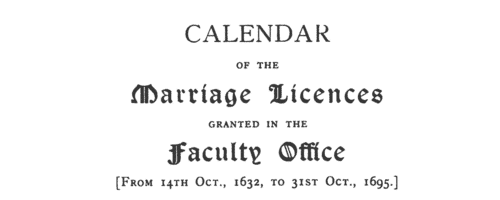
|  Apprentices registered in Norfolk
(1772) Apprentices registered in Norfolk
(1772)
Apprenticeship indentures and clerks' articles were subject to a 6d or 12d per pound stamp duty: the registers of the payments usually give the master's trade, address, and occupation, and the apprentice's name, as well as details of the date and length of the apprenticeship. There are central registers for collections of the stamp duty in London, as well as returns from collectors in the provinces. These collectors generally received duty just from their own county, but sometimes from further afield. The indentures themselves can date from a year or two earlier than this return. (The sample entry shown on this scan is taken from a Bristol return. Each entry has two scans, the other being the facing page with the details of the indenture, length of service, and payment of duty.) IR 1/58JAFFORD. Cost: £8.00.  | Sample scan, click to enlarge

| Masters of Merchantmen
(1785)
The Daily Universal Register of April 1785 includes a section entitled Ship News. This is compiled from reports from Portsmouth, Deal, Plymouth, Whitby, Cowes, Falmouth, Bristol and Gravesend as to merchant shipping movements; news of losses and sightings coming in from various ports; a list of Ships Arrived in the (London) River, in the Clyde, in the Creek(e), in the Downs, off the Lizard, off Scilly, off the Start, in Studland Bay, off Whitby, off the Wight, at Aberdeen, Alicante, Ancona, Antigua, Baltimore, Barbadoes, Barcelona, Bayonne, Belfast, Bombay, Bonny, Bordeaux, Brighthelmstone (Brighton), Bristol, Cadiz, Carlingford, Cartagena, Charlestown, Cork, Cowes, Cuxhaven, Dartmouth, Dominica, Dover, Dublin, Dunkirk, Falmouth, Galway, Gibraltar, Grenada, Guernsey, Halifax (Nova Scotia), Hamburg, Havre de Grace, Hull, Jersey, Kinsale, Lancaster, Leghorn, Limerick, Lisbon, Liverpool, Londonderry, Lochryan, Malaga, Marseilles, Montserrat, Nantes, New Providence (Bahamas), New York, Newry, Oporto, Ostend, Penzance, Plymouth, Poole, Portsmouth, Rotterdam, St Eustatia, St John's, St Kitts, St Vincents, Scarborough, Scilly, Seville, Southampton, Stangate Creek, Tenerife, Texel, Tobago, Venice, Waterford, Weymouth, Whitehaven, and in 'Africa', Georgia, Jamaica, Maryland, North Carolina, Philadelphia, South Carolina and Virginia; and Coast Lists made at the Custom House in London. Except in the home ports, the register refers only to British shipping: each ship is usually identified merely by its name, and the master's surname, although masters' christian names are given occasionally. Naval vessels are mentioned rarely, and their captains' names not usually stated. JAFFORD. Cost: £6.00.  | Sample scan, click to enlarge
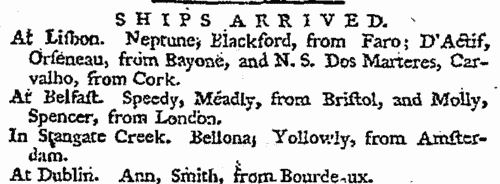
| Inhabitants of Poole in Dorset
(1790-1797)
The provincial sections of the Universal British Directory include lists of gentry and traders from each town and the surrounding countryside, with names of local surgeons, lawyers, postmasters, carriers, &c. (the sample scan here is from the section for Nottingham). The directory started publication in 1791, but was not completed for some years, and the provincial lists, sent in by local agents, can date back as early as 1790 and as late as 1797.
JAFFORD. Cost: £6.00.  | Sample scan, click to enlarge
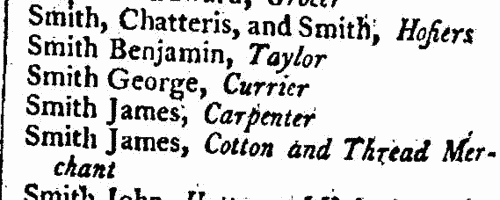
|  Outstanding soldiers of the 60th Regiment of Foot (The King's Royal Rifle Corps)
(1870-1875) Outstanding soldiers of the 60th Regiment of Foot (The King's Royal Rifle Corps)
(1870-1875)
Each year just a handful of outstanding soldiers of the regiment were chosen for good conduct medals and gratuities: these are listed here. There were two lists, one for men recommended for the Good Conduct Medal without a gratuity, and one for gratuities - £5 to a private, £10 to a corporal, and £15 to a serjeant. Both lists are indexed here, and each gives rank, name, regimental number, date of recommendation and date of issue. (The sample scan is from the 32nd foot). JAFFORD. Cost: £8.00.  | Sample scan, click to enlarge
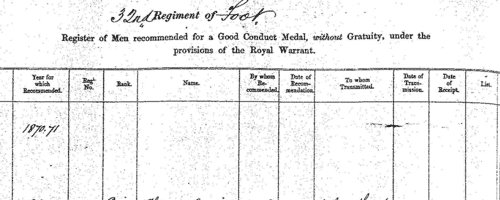
|
Research your ancestry, family history, genealogy and one-name study by direct access to original records and archives indexed by surname.
|













